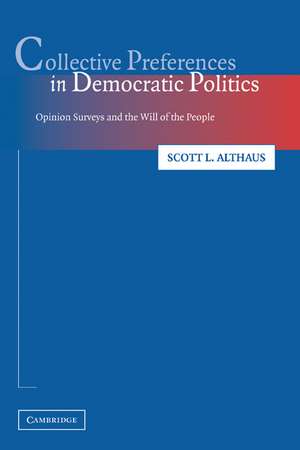Collective Preferences in Democratic Politics: Opinion Surveys and the Will of the People
Autor Scott L. Althausen Limba Engleză Paperback – 7 sep 2003
| Toate formatele și edițiile | Preț | Express |
|---|---|---|
| Paperback (1) | 325.01 lei 6-8 săpt. | |
| Cambridge University Press – 7 sep 2003 | 325.01 lei 6-8 săpt. | |
| Hardback (1) | 458.47 lei 6-8 săpt. | |
| Cambridge University Press – 7 sep 2003 | 458.47 lei 6-8 săpt. |
Preț: 325.01 lei
Nou
Puncte Express: 488
Preț estimativ în valută:
62.19€ • 64.80$ • 51.49£
62.19€ • 64.80$ • 51.49£
Carte tipărită la comandă
Livrare economică 04-18 aprilie
Preluare comenzi: 021 569.72.76
Specificații
ISBN-13: 9780521527873
ISBN-10: 0521527872
Pagini: 388
Ilustrații: 22 b/w illus. 25 tables
Dimensiuni: 152 x 226 x 25 mm
Greutate: 0.59 kg
Ediția:New.
Editura: Cambridge University Press
Colecția Cambridge University Press
Locul publicării:New York, United States
ISBN-10: 0521527872
Pagini: 388
Ilustrații: 22 b/w illus. 25 tables
Dimensiuni: 152 x 226 x 25 mm
Greutate: 0.59 kg
Ediția:New.
Editura: Cambridge University Press
Colecția Cambridge University Press
Locul publicării:New York, United States
Cuprins
1. Introduction; Part I. Illusions of Aggregation: 2. The power of noise; 3. Who speaks for the people?; Part II. Information Effects in Collective Preferences: 4. The impact of information effects; 5. The structure and causes of information effects; 6. The temporal dynamics of information effects; Part III. Opinion Surveys and Democratic Politics: 7. Opinion surveys and the will of the people; 8. What surveys can tell us about public opinion.
Recenzii
"This is a major work, arguably the most important in the study of public opinion since John Zaller's The Nature of Public Opinion. For many years distinguished scholars have suggested that, although citizens often are ill-informed and erratic in their judgments about politics, their errors and biases tend to cancel out. A comforting thought, if true. Althaus, however, provides the most compelling demonstration to date that it is false." Paul M. Sniderman, Stanford University
"No issue is more central to the theory and practice of democratic politics than the relationship between individual public opinion and the collective will of the people. This subject has generated a lively, multi-faceted, and ongoing debate on topics such as how best to measure public opinion, the role of political knowledge in the formation, stability, and expression of public opinion, and the relationship between opinions and, as Tocqueville put it, 'self interest rightly understood.' Collective Preferences in Democratic Politics is an important and timely contribution to this debate that will be of interest to both public opinion specialists, and more general students of democratic theory and practice. It is an impressive blend of theory and research, is methodologically creative, sophisticated and sound, and is well written and convincingly argued." Michael X. Delli Carpini, University of Pennsylvania
"Proponents of democratic decision making usually avert their eyes from the fact that many citizens know little about the issues on which they are asked to make judgments or, even worse, they 'know' things that are factually mistaken. Scott Althaus addresses this problem head-on and finds that variations in knowledge do indeed bias the outcomes of opinion surveys in a troubling way. But not always, and not unavoidably--this is no jeremiad. Instead, Althaus gives sensible, thoughtful, usable suggestions for overcoming problems that most would rather ignore. This is a vitally important book for all who care about both democracy and political fairness." Jennifer L. Hochschild, Harvard University
"No issue is more central to the theory and practice of democratic politics than the relationship between individual public opinion and the collective will of the people. This subject has generated a lively, multi-faceted, and ongoing debate on topics such as how best to measure public opinion, the role of political knowledge in the formation, stability, and expression of public opinion, and the relationship between opinions and, as Tocqueville put it, 'self interest rightly understood.' Collective Preferences in Democratic Politics is an important and timely contribution to this debate that will be of interest to both public opinion specialists, and more general students of democratic theory and practice. It is an impressive blend of theory and research, is methodologically creative, sophisticated and sound, and is well written and convincingly argued." Michael X. Delli Carpini, University of Pennsylvania
"Proponents of democratic decision making usually avert their eyes from the fact that many citizens know little about the issues on which they are asked to make judgments or, even worse, they 'know' things that are factually mistaken. Scott Althaus addresses this problem head-on and finds that variations in knowledge do indeed bias the outcomes of opinion surveys in a troubling way. But not always, and not unavoidably--this is no jeremiad. Instead, Althaus gives sensible, thoughtful, usable suggestions for overcoming problems that most would rather ignore. This is a vitally important book for all who care about both democracy and political fairness." Jennifer L. Hochschild, Harvard University
Descriere
This book advises how to make better use of opinion polls to represent the people's voice.










